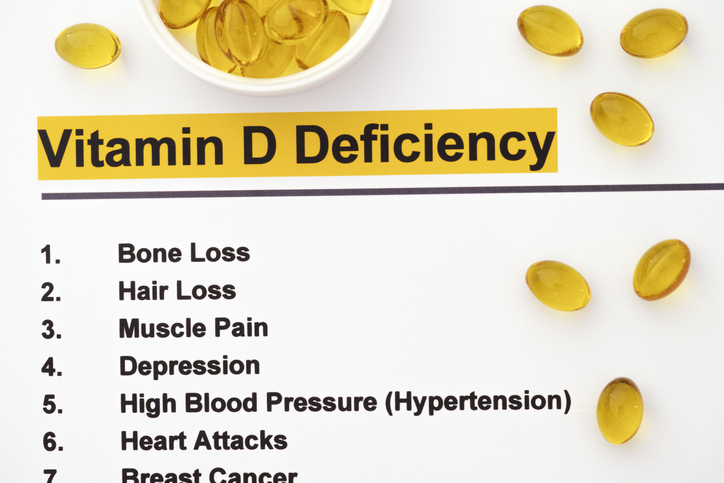If You Live in This Half of the United States, Vitamin D Deficiency may be a Real Threat

By Joy Stephenson-Laws, JD, Founder
If you live in the 37th parallel, you are at a greater risk of developing a vitamin D deficiency.
Vitamin D is also referred to as the “sunshine vitamin” because it can be made from sunlight exposure directly on to our skin. It is one of those nutrients that is crucial for maintaining our overall health. Along with helping build and maintain strong bones, vitamin D may balance insulin levels and help with the management of diabetes, support lung function and cardiovascular health and even influence the expression of genes involved in cancer development.

To put it simply, the 37th parallel is any region north of 37 degrees north latitude. Take a look at this map and article about vitamin D deficiency in this area from Fox Weather.
“This vitamin D deficiency is of particular concern for people who live in areas that don’t receive much direct sunlight, particularly when the seasons change. People who bask in plenty of sunlight during the summer end up experiencing a shortage of direct sunlight and vitamin D come fall, when the Northern Hemisphere is tilted away from the Sun,” according to Fox Weather.
“The demarcation line for the sunlight haves and have-nots falls around the 37th parallel, or 37 degrees north latitude on a map. This horizontal line begins just south of San Francisco, runs through the northern border of Texas Panhandle and Oklahoma and then along the northern border of North Carolina.”
Some cities like Seattle, New York, Boston, Minneapolis, Chicago, St. Louis and Salt Lake City are affected.
As you can see, it is a very significant portion of the country. Several reports say that more than 40 percent of Americans are deficient in vitamin D. In addition to this, darker skinned people are at a greater risk of having a vitamin D deficiency. Darker skin contains more melanin (which is essentially pigment), which provides more of a barrier from absorbing sunlight and being able to make vitamin D (compared to lighter skin).

Just to give a bit more perspective on how crucial this vitamin is, vitamin D may even slow the progression of multiple sclerosis (MS). Furthermore, a recent study published in the Journal of Human Nutrition and Dietetics found evidence suggesting that taking 2000 IU/day of a vitamin D supplement may be very effective in combating muscle damage and inflammation after exercise.
“Although it is not known whether vitamin D has a direct impact on muscle function,vitamin D receptors have been identified in muscle cells, which supports the idea of a direct impact on muscle contraction. It has been suggested that vitamin D deficiency may affect the muscles' capacity for recovery after exercise. Vitamin D has anti-inflammatory properties because it downregulates the synthesis of specific pro-inflammatory cytokines,” according to the study report.
Just because you may not live in the 37th parallel does not mean that you are immune to a vitamin D deficiency.When the weather gets colder, people usually spend more time indoors despite where they may live. Some may live in a sunny, warmer climate but spend a lot of time inside due to their jobs. In addition to this, having certain medical conditions can put a person at a risk of developing a vitamin D deficiency.
For example, “Because vitamin D is fat soluble, its absorption depends on the gut’s ability to absorb dietary fat. Fat malabsorption is associated with medical conditions that include some forms of liver disease, cystic fibrosis, celiac disease, Crohn’s disease, and ulcerative colitis. In addition to having an increased risk of vitamin D deficiency, people with these conditions might not eat certain foods, such as dairy products (many of which are fortified with vitamin D), or eat only small amounts of these foods. Individuals who have difficulty absorbing dietary fat might therefore require vitamin D supplementation,” according to the National Institutes of Health’s Office of Dietary Supplements.
Vitamin D Testing is a good idea.
One sure way to determine whether you are deficient in vitamin D is to take a nutrient test. If the test reveals a deficiency, a competent healthcare professional can help you select a safe, quality supplement. Very few foods contain vitamin D. There are vitamin D fortified foods, however, in most cases a supplementation for vitamin D deficiency is necessary.
I want to reiterate how important it is to supplement in a safe manner. It is possible to overdose on supplements. I highly recommend reading this previous pH blog:
Man Loses 28 Pounds From Vitamin D Intoxication. Be Proactive About Supplement Overdose
I would also read:
Why Vitamin D May Be One of the Keys to Healthy, Happy Longevity
Enjoy your healthy life!
Disclaimer: This article is not intended to provide medical advice. Please consult with your doctor or another competent healthcare practitioner to get specific medical advice for your situation.
The pH professional health care team includes recognized experts from a variety of health care and related disciplines, including physicians, attorneys, nutritionists, nurses, and certified fitness instructors. This team also includes the members of the pH Medical Advisory Board, which constantly monitors all pH programs, products, and services. To learn more about the pH Medical Advisory Board, click here.



